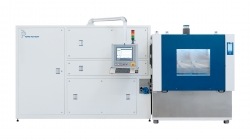Produkte Auf Der Messe
Pressure cycle test bench for thermal management components
Poppe + Potthoff Maschinenbau
 Thermal management is needed to optimize battery efficiency, vehicle safety and comfort in electric vehicles. As EVs lack combustion engine heat, advanced heating and cooling systems are essential. Testing these thermal management components ensures performance and reliability. The German company Poppe + Potthoff Maschinenbau will be showing its customized test solutions at the expo, including pressure cycling, burst pressure and functional tests under real-world conditions.
Thermal management is needed to optimize battery efficiency, vehicle safety and comfort in electric vehicles. As EVs lack combustion engine heat, advanced heating and cooling systems are essential. Testing these thermal management components ensures performance and reliability. The German company Poppe + Potthoff Maschinenbau will be showing its customized test solutions at the expo, including pressure cycling, burst pressure and functional tests under real-world conditions.
In a typical test, components like ECU cooling units or valves undergo over 100,000 load cycles to simulate a vehicle’s lifespan. Using a water-glycol or pure glycol mixture, cooling circuits are tested at -40°C to +20°C, while heating circuits endure +20°C to +140°C. A closed test media circuit prevents explosive vapors. Tests can be conducted in climate chambers, with optional over- and under-pressure testing. Flow rates range from 1-50 l/min at 0.2-12 bar (or higher), with programmable load cycles at 0.2-2Hz or faster.
A long-term test lasts 20-30 days, depending on load change frequency. Temperature, volume flow and ambient conditions vary per test specifications. Measurements include inlet/outlet temperature, flow rate, pressure, voltage and current. The focus is on thermal and electrical performance, with sensors detecting energy loss (thermal bridges) or overheating risks.
Booth: 8030